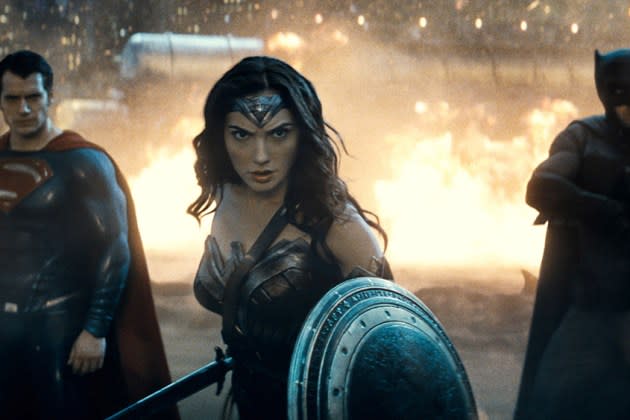When Superman and Batman Copyrights Expire in a Decade, Will It Be Kryptonite for DC?

About a decade ago, Zack Snyder developed a storyline for the DC Extended Universe that involved Bruce Wayne impregnating Lois Lane.
The subplot in which Batman cuckolds Superman was poised to unfold in “Justice League,” with Batman dying in the sequel and Lois raising their spawn with Superman. Snyder’s vision for Wonder Woman was equally unorthodox, with visuals featuring a superheroine who brandished the decapitated heads of her conquered enemies like an ISIS jihadi.
More from Variety
Warner Bros. and DC Studios — which hold a firm grip on their intellectual property — rejected Snyder’s ideas, which were deemed “super creepy,” according to a source familiar with the back and forth. (DC declined to comment for this story. A representative for Snyder did not respond to a request for comment.) But in the next decade, artists and rival studios won’t need permission to create their own take on the characters.
A sad fact of Hollywood is that while superheroes never truly die, all copyrights do. On Jan. 1, Disney lost control of “Steamboat Willie,” and within 24 hours two horror-comedies starring Mickey Mouse were announced. The DC characters are the next major expirations looming on the horizon. Superman and Lois Lane will enter the public domain in 2034, followed by Batman in 2035, the Joker in 2036 and Wonder Woman in 2037.
Chris Sims, a comic book author and Batman expert, expects a flood of unauthorized Batman comics to hit the stands as soon as the copyright expires.
“There’s going to be 100 of them,” he says. “They’re going to have them ready to go.” Movie producers will also be able to make their own versions — much as they already do with public domain characters like Dracula and Robin Hood — though in the beginning they will have to stick to the original versions of the characters.
“You get Batman, but you don’t get Robin,” Sims says. “You get Superman, but you don’t get kryptonite.”
The initial Superman could only leap — not fly. “Those characteristics are going to fall into the public domain one by one,” says Amanda Schreyer, media and entertainment lawyer at Morse.
DC has been preparing for this for years. At a press event in 2023, CEO James Gunn noted that the next Superman film will introduce characters from “The Authority,” a comic series that launched in 1999, in part because the Superman copyright is about to expire.
Jay Kogan, DC’s deputy general counsel, laid out a strategy to protect characters that fall into the public domain in a 2001 article. Since only the older versions lose protection, he urged: “Keep ’em fresh and up-to-date.”
“By gradually changing the literary and visual characteristics of a character over time, a character owner can keep whatever the then-current image of the character is as the de facto standard in the public consciousness,” he wrote.
The company has done a good job of updating Superman, argues Steven Beer, an IP lawyer at Lewis Brisbois Bisgaard & Smith.
“The public’s perception is the contemporary Superman. It’s distinctive,” he says. “That gives them a lot of protection.”
Another tactic: Maintain a high level of quality control.
“The public should be conditioned to view any works from unrelated parties featuring a trademark owner’s characters as second-rate knockoffs,” Kogan wrote.
Kogan also suggested that trademarks could be used to block the use of a character’s name, image and slogan even after the copyright expires.
But trademark is not a cloak of immunity, argues Jennifer Jenkins, director of Duke’s Center for the Study of the Public Domain. “That only prevents uses that are likely to cause consumer confusion about source or sponsorship,” she says.
In other words, the characters’ names should be fair game, so long as it’s clear that the depiction is not coming from DC.
“You could still create a Superman horror movie or Batman horror movie,” says Jonathan Steinsapir, an IP attorney at KHIKS. “You just need to be careful about how you advertise it and how you use images of Superman in a branding sense.”
DC has done a careful job of tying the characters to itself by trademarking the terms “Man of Steel” and “Caped Crusader,” as well as Superman’s “S” and Batman’s logo.
“The bat symbol is a very strong mark,” Schreyer says. “That is going to limit what subsequent creators can do.”
Even so, expect the mid-2030s to see a glut of off-brand superhero content.
“People will make a run at these characters because there’s money to be made,” says Mark Waid, a comic book author and historian best known for his work on DC Comics titles like “Superman: Birthright.” “Or how about Superman versus Godzilla. It’s a gray area. But this town works on the speed of capitalism, right? That’s how we work.”
Sims believes more superhero comics will be a good thing. But the idea that there will be a Superman renaissance is oversold, he says.
“It’s gonna come down to execution,” Sims says. “There’s one company that’s used to doing it.”
Steinsapir says nothing would keep Snyder from making a non-Warners film featuring the DC troika.
“Zack Snyder could reshoot it and make his own new iteration of it,” he says. “You just need to be careful. For example, he definitely couldn’t call it ‘Justice League.’”
Best of Variety
Sign up for Variety’s Newsletter. For the latest news, follow us on Facebook, Twitter, and Instagram.

